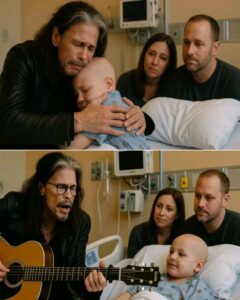The oncology ward at Boston Children’s Hospital had seen its share of heartbreak, but nothing quite like the day Steven Tyler walked through its doors. Dressed simply in black, his signature scarf draped around his neck, the Aerosmith frontman moved quietly through the hall, no fanfare, no entourage—just a man on a mission. He wasn’t there to perform for thousands or sign autographs. He was there for one child, a young fan bravely battling cancer, whose only wish had been to meet the legendary rocker.

As Tyler stepped into the hospital room, the usual hum of machines and quiet conversations fell away. Nurses paused mid-step, doctors held their breath, and the child’s parents looked up in disbelief. Tyler said nothing at first. He simply approached the bedside, knelt down, and gently took the child’s hand in his own. For a long moment, he just held it, letting the silence speak. Then he whispered, “You’re braver than any rockstar I know.”
The child, weakened but still smiling faintly, nodded. That’s when Tyler leaned in and asked softly, “Can I sing for you?” The parents, overcome with emotion, could only nod through their tears. There was no microphone, no band—just the raw, unfiltered voice of a rock legend singing from the depths of his soul.
He began to sing “Amazing,” the classic Aerosmith ballad, but this time it wasn’t a concert performance—it was a prayer, a lullaby, a gift. His voice, weathered by decades on stage, trembled with emotion as it echoed through the sterile room, each word laced with meaning. The lines, “With the blink of an eye, you finally see the light,” seemed to take on new weight, resonating deeply with everyone present.
Doctors stood silently in the doorway, some with heads bowed, others wiping their eyes. Nurses leaned against the walls, visibly moved. The child’s parents stood frozen, their hands clasped, tears streaming freely. Later, the mother would say, “It was like he was singing straight to our child’s soul. It wasn’t a song anymore—it was something holy.”
As the final note faded into the quiet hum of medical machines, Tyler reached down and kissed the child’s forehead. He looked into their eyes and whispered, “Keep fighting, kiddo. You’re the real inspiration.” Then, without another word, he stood, gave a small nod to the family, and walked out, leaving a room full of tears—and hope.
Witnesses would later describe it as one of the most human moments they had ever seen. Not a performance, not publicity—just a man using what he had to bring light to a very dark place. And for those few minutes, in that tiny hospital room, music became medicine, and a rockstar became something more: a messenger of grace, love, and courage


